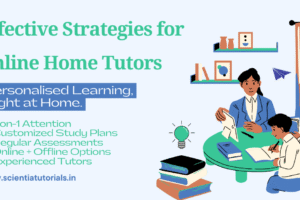Fostering Independence: A Guide for Home Tutors on Helping Students Develop Independent Study Habits
Introduction
In today’s fast-paced and information-rich world, independent study habits are essential for students to thrive academically and personally. As a home tutor, your role extends beyond just teaching subject matter; it includes nurturing students’ abilities to learn on their own. This article will explore practical strategies and techniques for home tutors to help students develop effective independent study habits, laying a strong foundation for lifelong learning.
The Importance of Independent Study Habits
Independent study habits empower students to take control of their learning. By fostering these habits, tutors can help students achieve several benefits, including:
- Improved Time Management: Students learn to allocate time effectively for their studies and other activities.
- Enhanced Critical Thinking: Independent study encourages students to analyze, evaluate, and synthesize information.
- Increased Motivation: When students take charge of their learning, they develop intrinsic motivation and a sense of ownership over their education.
- Better Academic Performance: Students with strong independent study habits often achieve higher grades and retain information more effectively.
Understanding Your Students
Assessing Individual Learning Styles
Every student has a unique learning style, and recognizing this is the first step in helping them develop independent study habits. Some common learning styles include:
- Visual Learners: These students grasp information better through diagrams, charts, and visual aids.
- Auditory Learners: They retain information through listening, so discussions and verbal explanations are beneficial.
- Kinesthetic Learners: These students learn best through hands-on experiences and physical activities.
Encourage students to identify their learning styles and incorporate techniques that align with them. This personalized approach can make studying feel less daunting and more enjoyable.
Identifying Strengths and Weaknesses
Understanding each student’s strengths and weaknesses allows you to tailor your guidance effectively. Conduct assessments or informal quizzes to identify areas where a student excels and those that require improvement. This knowledge will help you guide them in creating a focused and effective independent study plan.
Setting Goals for Independent Study
Short-Term vs. Long-Term Goals
Goal-setting is a powerful tool in developing independent study habits. Help students set both short-term and long-term goals.
- Short-Term Goals: These should be specific, measurable, achievable, relevant, and time-bound (SMART). For example, a student might aim to complete two chapters of a textbook by the end of the week.
- Long-Term Goals: These are broader objectives that may span months or years. For instance, a student might aim to improve their overall GPA by a specific percentage by the end of the semester.
Encourage students to write down their goals and revisit them regularly to track their progress. This practice reinforces accountability and motivation.
Creating a Structured Study Plan
The Importance of a Study Schedule
A well-structured study schedule is vital for promoting independent study habits. Help students design a personalized study plan that includes:
- Daily Study Blocks: Allocate specific times each day for studying, breaking the material into manageable chunks.
- Breaks: Encourage students to incorporate short breaks between study sessions to prevent burnout and enhance focus.
- Variety: Include a mix of subjects and activities to keep the study routine fresh and engaging.
Flexibility in the Schedule
While structure is essential, it’s also important to emphasize flexibility. Life can be unpredictable, and students should feel empowered to adapt their schedules when necessary. Teach them the importance of adjusting their study plans to accommodate changes without losing focus on their overall goals.
Implementing Effective Study Techniques
Active Learning Strategies
Encourage students to engage actively with the material they are studying. Here are a few techniques to promote active learning:
- Summarization: After reading a section, have students summarize the key points in their own words.
- Question Generation: Encourage students to formulate questions about the material. This promotes critical thinking and deeper understanding.
- Teach Back: Have students explain concepts to you as if they were teaching you. This reinforces their understanding and highlights any gaps in knowledge.
Utilizing Study Resources
Introduce students to various study resources that can aid their independent learning, such as:
- Online Learning Platforms: Websites like Khan Academy and Coursera offer valuable resources on a wide range of subjects.
- Library Resources: Encourage students to explore their local library for books, articles, and other materials related to their studies.
- Study Groups: Suggest forming study groups with peers, where students can share knowledge, discuss concepts, and motivate each other.
Encouraging Self-Motivation
Building a Positive Mindset
A positive mindset is crucial for fostering independence in learning. Help students cultivate a growth mindset by emphasizing the following:
- Embrace Challenges: Encourage them to view challenges as opportunities for growth rather than obstacles.
- Celebrate Achievements: Acknowledge their progress and celebrate both small and large accomplishments. This reinforces the belief that their efforts lead to success.
Providing Constructive Feedback
Feedback plays a critical role in helping students stay motivated and improve their study habits. Offer constructive feedback that focuses on:
- Specific Areas for Improvement: Highlight areas where the student can enhance their performance.
- Positive Reinforcement: Balance constructive criticism with praise for what they did well, which can boost their confidence and motivation.
Teaching Time Management Skills
Prioritizing Tasks
Teach students how to prioritize their tasks effectively. Introduce methods such as:
- The Eisenhower Matrix: This tool helps students categorize tasks based on urgency and importance, guiding them in deciding what to tackle first.
- To-Do Lists: Encourage students to create daily or weekly to-do lists, breaking down larger tasks into manageable steps.
Using Technology for Time Management
Introduce students to digital tools and apps designed to help with time management, such as:
- Calendar Apps: Tools like Google Calendar allow students to schedule study sessions and set reminders for important deadlines.
- Pomodoro Technique Apps: These apps promote focused study intervals followed by short breaks, helping students maintain concentration and manage their time effectively.
Promoting Accountability
Regular Check-Ins
Schedule regular check-ins with students to discuss their progress, challenges, and goals. This not only provides an opportunity for feedback but also fosters a sense of accountability. During these sessions, encourage open communication and discuss any obstacles they may be facing.
Parental Involvement
Encourage parents to play an active role in their child’s independent study journey. They can support their child by:
- Creating a Suitable Study Environment: Help ensure that students have a quiet, organized space conducive to studying.
- Providing Encouragement: Parents can motivate students by acknowledging their efforts and celebrating their achievements.
Conclusion
Helping students develop independent study habits is a rewarding journey that requires patience, creativity, and understanding. By implementing effective strategies such as personalized goal-setting, structured study plans, active learning techniques, and fostering a positive mindset, home tutors can empower their students to take ownership of their learning. As students gain confidence in their ability to study independently, they will not only achieve academic success but also develop skills that will serve them well throughout their lives.
Key Takeaways:
- Assess each student’s learning style and strengths to tailor your approach.
- Encourage goal-setting and create a structured study plan.
- Promote active learning techniques and time management skills.
- Foster a positive mindset and encourage self-motivation.
By following these guidelines, you can make a significant impact on your students’ academic journeys, preparing them for future success.



